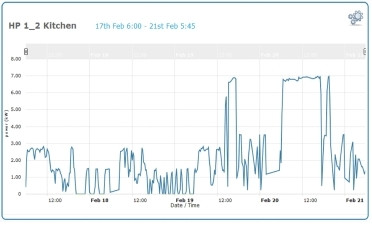
Online energy metering at Zuid Afrikaans Hospital, in Pretoria, is making it possible to determine the energy savings achieved by recently installed hybrid solar water heating systems with heat pump backup. A number of online meters were installed at Zuid Afrikaans Hospital in 2013, as part of a Green Economy energy-saving project, including measuring the total electricity consumption at the incoming feeds to the hospital.
"Affordable online energy metering will form the backbone of a sustainable Green Economy in South Africa," says Michelangelo Technology CEO Andr'e Nel. "By measuring real-time energy usage and peak demand, electricity consumption can be managed and savings verified. Last week, Eskom announced the first 2014 power emergency and load-shedding schedules, while requesting major industrial customers to reduce consumption by 10%. Online metering makes it possible for consumers to implement proactive steps to avoid excessive energy usage during peak hours, relieving strain on the grid while achieving savings of up to 35%."
The kitchen at Zuid Afrikaans Hospital uses around 1 300l of hot water on a daily basis, and was consuming approximately 106kWh of electricity per day using two 200l electric geysers. By installing five solar collectors and 1 000l of hot water storage to preheat the water, switching off the geyser elements and using two 5kWt heat pumps, Michelangelo's online meter measured a 72% saving in energy, with peak demand reduced by up to 5kVA. This translates into an average energy saving of about 2 100kWh per month, resulting in projected annual savings of more than R25 000.
Michelangelo Technology completed the installation of 20 locally manufactured flat plate solar thermal collectors, with 4 000l of hot water storage, in January 2014 at Zuid Afrikaans Hospital. Michelangelo's solar collectors and hot water storage tanks have a 10-year warranty. The project was approved by Soltrain (Austria) and was awarded a grant as a solar technology demonstrator promoting solar water heating in South Africa.
A two-year installation warranty is provided, and the design and quality of the installation needs to be approved by Soltrain. Taking the Soltrain grant and Eskom rebates into account, payback of less than two years is projected at Zuid Afrikaans Hospital. Typically, a payback period of about three years is achieved with Michelangelo's low pressure solar thermal design incorporating plastic hot water storage tanks and heat pump backup that qualify for Eskom rebates. Pressure is restored by means of an energy-efficient pressure booster pump.
The online meter indicates 1.4kW/2.8kW demand of solar assisted heat pumps versus 3.5kW/7kW demand of geyser elements (switch over to geyser elements on 19 February, with measurement 20 February - 72% energy saving)
Share
Michelangelo Technology
Established in 1999, Michelangelo Technology has been developing energy-efficient solutions for the last eight years. Significant exports into Africa have made it possible to fund the in-house development of energy-efficient theft-proof safe computers, as well as solutions for modular green construction. Today, Michelangelo's Green Economy business model is based on online metering for managing electricity and water usage with solutions including energy-efficient heat pump assisted solar water heating and LED lighting, as well as DC inverter air-conditioning along with water conservation and grey water recycling. Michelangelo's Green Economy projects are feasible in almost all cases, with payback in +/- three years, and are scalable to include residential, hospitality, educational, commercial and industrial markets. Visit www.michelangelotech.co.za.
Editorial contacts